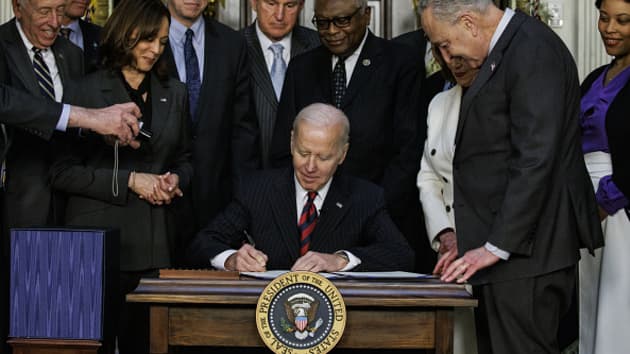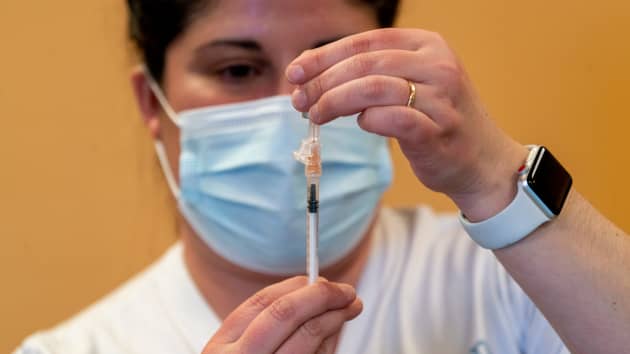Biden signs government funding bill that includes $13.6 billion in Ukraine aidPresident Joe Biden signed a funding bill to keep the government running through September and send $13.6 billion in aid to Ukraine.
The money for Ukraine will go both to helping refugees fleeing Russia’s invasion and to defensive equipment and training for the country’s military.
Biden is set to travel to Brussels next month for a summit among NATO leaders.  President Joe Biden, center, signs H.R. 2471, the “Consolidated Appropriations Act, 2022,” in the Indian Treaty Room of the White House in Washington, D.C., on Tuesday, March 15, 2022.
President Joe Biden, center, signs H.R. 2471, the “Consolidated Appropriations Act, 2022,” in the Indian Treaty Room of the White House in Washington, D.C., on Tuesday, March 15, 2022.President Joe Biden on Tuesday signed a $1.5 trillion bill that funds federal operations through September and sends billions of dollars in aid to Ukraine as the country fights off a Russian invasion.
Washington had to approve a spending plan by the end of the day to prevent a government shutdown.
The bill includes $13.6 billion for assistance to Ukraine, which fits into a broader U.S. effort to bolster Ukrainian defense, hamper Russia’s economy and support civilians displaced by the war. The money will fund defensive military equipment and training, along with aid for Ukrainian refugees both within the country and in neighboring nations.
“We’re moving further to augment support to the brave people of Ukraine as they defend their country,” Biden said Tuesday before he signed the bill. He added that the U.S. will be “better positioned to provide for the rapidly growing humanitarian need of the Ukrainian people.”
Biden signed the bill shortly after the White House announced he would travel to Brussels this month for an extraordinary summit about Russia’s attack on Ukraine. He also approved the funding hours before Ukrainian President Volodymyr Zelenskyy’s planned address to the U.S. Congress on Wednesday morning.
While the bill includes critical funding for U.S. efforts in Ukraine, it also stamps out some risks in the U.S. for now. The federal government will avoid a shutdown, which can damage the economy and put many federal employees out of work temporarily.
The bill provides enough money to cover federal spending through the end of the fiscal year Sept. 30 after Congress passed multiple stopgap plans to keep the lights on in recent months.
Lawmakers will have to approve another funding bill later this year as the midterm elections approach.
The funding legislation did not include $15.6 billion in supplemental coronavirus relief that was originally tucked into the plan. The White House has warned its efforts to curb and treat infections will suffer if Congress does not approve more aid.
While the Democratic-held House could pass more pandemic relief money, Senate Republicans may block it from getting to Biden’s desk.
https://www.cnbc.com/2022/03/15/biden-signs-government-funding-bill-with-ukraine-aid.htmlWhite House says U.S. will run out of money to fight pandemic if Congress doesn’t pass Covid funding billThe White House is urging Congress to pass $22.5 billion in Covid spending, warning that the U.S. is running out of money to fight the virus.
House Democrats last week stripped $15 billion in Covid funding from a broader spending bill after failing to reach a bipartisan agreement with Republicans.
The White House said the U.S. will not have enough money for booster shots, antiviral pills, monoclonal antibodies and robust testing if Congress fails to approve more funding.
The White House on Tuesday warned the U.S. won’t have enough booster shots and lifesaving Covid treatments for Americans if Congress fails to pass $22.5 billion in additional pandemic funding.
Senior Biden administration officials, on a call with reporters, said the U.S. could face another wave of Covid infections in the coming months, even as new cases and hospitalizations have dramatically declined from the peak of the unprecedented omicron surge in January. Infections are already on the rise again in major European nations, such as the U.K. and Germany. China is battling its worst outbreak since 2020.
The officials warned the funding is urgently needed to get ahead of another Covid wave. House Democrats last week stripped $15 billion in coronavirus funding, which was already less than Biden requested, from a broader spending bill after failing to reach a bipartisan agreement with Republicans. The GOP has insisted that Congress offset new Covid money by cutting funds for state and local governments allocated for the spring, a demand many Democrats were unwilling to accept.
The senior administration officials told reporters the federal government will not be able to purchase enough booster shots, vaccines that target specific variants or more antiviral pills beyond the 20 million already on order from Pfizer if more funding isn’t approved.
There is also no more funding for additional monoclonal antibody treatments, including an order planned for March 25, the officials said. If more funding doesn’t come through, the federal government will have to cut state allocations of monoclonal antibodies by more than 30% starting next week, they said.
The federal government will also not be able to maintain sufficient Covid testing capacity beyond June in the event of another surge, the officials said. During the omicron wave, there was a run on at-home tests and in-person clinics, resulting in hourslong lines and empty pharmacy shelves.
Uninsured people will also no longer have coverage for Covid testing and treatments, according to the White House. The fund that covers them will stop accepting new claims a week from now, forcing health-care providers to either absorb the costs or turn patients away, the officials said. The fund will completely end in early April and the uninsured will no longer have coverage for vaccinations, they said.
Some investments made in surveillance of new Covid variants will also have to be wound down, the officials said, leaving the U.S. without the capabilities it needs to stay on top of how the virus is evolving. The emergence of the highly mutated omicron variant blindsided the U.S. and much of the world in November.
The White House said the money is also needed to fund the development of a vaccine that covers a range of Covid variants, and support the administration’s efforts to help increase the vaccination rate in developing nations. Without the money, the risk will rise that new variants will emerge, the officials said. Omicron emerged in South Africa and Botswana, and the delta variant was first identified in India.
https://www.cnbc.com/2022/03/15/covid-white-house-says-us-will-run-out-of-money-to-fight-pandemic-.htmlBiden heading to Brussels for NATO meetingU.S. President Joe Biden plans to travel to Brussels next week to meet with NATO allies about bolstering support for Ukraine as it fights to fend off Russia’s unprovoked attack.
The “extraordinary summit” on March 24 will bring together North American and European leaders to discuss “further strengthening NATO’s deterrence & defence,” NATO Secretary-General Jens Stoltenberg said.
The alliance is expected to call on its military commanders Wednesday to send more troops and missile defenses to eastern Europe, Reuters reported. Ukraine President Volodymyr Zelenskyy is also scheduled to address U.S. lawmakers Wednesday morning.
https://www.cnbc.com/2022/03/15/russia-ukraine-live-updates.html